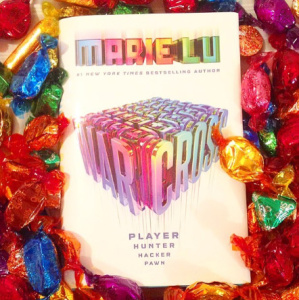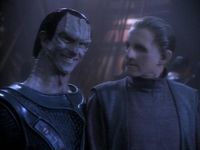Marie Lu’s work tends to be very hit or miss for me but Warcross, whilst by no means perfect, was a hit.
Whilst there were some issues with the writing (such as lacking descriptions and world building flaws at times, but we’ll get to that later) the way this book was written allowed me to fall straight into it. It was easy to read 100 pages without really noticing!
Did you love Ready Player One? Well, you’re going to be disappointed by this. Now I’m not saying this is a bad book, it’s not. But the premise is similar to Ready Player One and Warcross isn’t in the same ball game here, in fact it’s not even the same sport. But it is still enjoyable; I just don’t want people to go into this hoping for a story on par with Ready Player One.
As I’ve just said, I loved the concept but the world building was seriously lacking throughout, particularly in Warcross itself. When we’re entering a virtual world, we really want to feel transported there just like the characters, but it fell a little flat here. The tournaments and the gameplay whilst in Warcross were really interesting and seemed like they could have been a lot of fun to read about and get immersed in, but it just didn’t happen – which is a massive shame because Warcross is such a visual book.
“The virtual overlays in my view adjust – and suddenly, the true night sky appears overhead, a sheet of spring constellations against countless numbers of stars, silver and gold and sapphire and scarlet, so bright that the Milky Way band itself is visible.”
 I think the whole story focused too much on one thing *cough* dumb, cliché romance *cough* (but more on that later!) and not enough on what was pretty much the core part of the story – the spy hunter vs hunted element. I feel a bit cheated that we didn’t get a lot of tension with the cat-and-mouse aspect.
I think the whole story focused too much on one thing *cough* dumb, cliché romance *cough* (but more on that later!) and not enough on what was pretty much the core part of the story – the spy hunter vs hunted element. I feel a bit cheated that we didn’t get a lot of tension with the cat-and-mouse aspect.
Some descriptions throughout the book were absolutely gorgeous, and some were quite bare-bones. It kind of disjointed the immersion a little.
I actually enjoyed a lot of the characters, but the two I had the biggest issues with were the main characters; Emika and Hideo. Let’s start with Emika.
Emika, our protagonist, was actually quite dull. Rainbow coloured hair (which was mentioned far too often) and tattoos don’t cover up a bland character with no discernible personality. Not to mention we’ve seen this character before: the criminal with a permanent record which halts her future career progressions so she continues her life in the underbelly of society. But *shock* she’s only a criminal because she was defending or avenging an innocent person. *yawn*.
“Death has a terrible habit of cutting straight through every careful line you’ve drawn between your present and your future.”
But Emika has nothing on Hideo, the creator of Warcross. Hideo is a colour-by-numbers, good looking yet cold and distant and oh-so-mysterious and rich celebrity amongst Warcross players. What could make these two worse? A romance between them!
I hated this romance. Actually, whilst I’m here: Hey YA authors! Not all YA needs to have a romantic relationship! And definitely not one like this, which is so expected and cliché it’s an utter bore to read about. Plus I genuinely didn’t feel any chemistry between Hideo and Emika.
 As much as I hate to admit it, there were a lot of parallels between the romance in Warcross and the “romance” in Fifty Shades of Grey. Don’t believe me? Here are some facts from Warcross – you tell me when you see what I see:
As much as I hate to admit it, there were a lot of parallels between the romance in Warcross and the “romance” in Fifty Shades of Grey. Don’t believe me? Here are some facts from Warcross – you tell me when you see what I see:
Hideo is a billionaire, unbelievably attractive, and a few years older than our protagonist, who he inexplicably falls for despite her being from a completely different world and lower in social status in every way to him: her lifestyle, her salary and her aspirations are completely different to his. She only really has one friend who we don’t see much of. He pays all of her debts and bills and flies her out on his private jet to Tokyo. He has a way of always being able to contact her privately, via technology, in a way that no one else is able to.
See. I told you.
But at least there’s not a horrifyingly abusive sexual relationship being misrepresented as BDSM because the author doesn’t know what the fuck she’s talking about and has helped to normalise physical and psychological abuse. Fuck you E.L James, you hack.
Right, back to the review. Where was I? Oh yeah, the characters. One good thing about the characters is that they are incredibly diverse. Marie Lu has taken full advantage of Warcross being a global phenomenon so that she could include characters of all races, sexual orientations and have men, women and even disabled characters in Warcross. The even better thing is that these characters didn’t feel like they were included to fit a ‘diversity quota’ – their inclusion felt genuine and natural.
“‘But you control the algorithm.’
His eyes narrow slightly. ‘I do.'”
Unfortunately, I saw the ‘twist’ coming from a mile away, but it didn’t exactly spoil the book for me.
In all honesty, Warcross felt like a prequel at times, almost like it was setting us up for the next books in the series. Hopefully all the kinks will be worked out of the next books and characters and world building will be fleshed out.
It’s not the best nor the cleverest book in this sub-genre, and it was full of tropes and clichés, but all in all it was an enjoyable rad and I will read the rest of the series.
“Then we continue to stand there, unmoving, looking out at the electric glitter of Tokyo, my boots pointed away from the house and toward the city, my heart suspended somewhere between one choice and another, unsure where to go next.”
[PLEASE NOTE]: I was not paid or sponsored to write this review – all the opinions are honest and my own.
Advertisements Share this:




